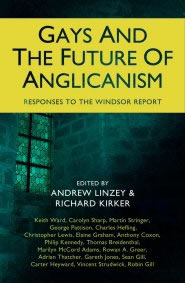Gays and the Future of Anglicanism
Reflects on the future shape of the Church.

Reflects on the future shape of the Church.
Reflects on the future shape of the Church.
Christianity (general), Sexuality & gender studies
The Anglican Communion stands at a crossroads. Some want Anglicanism to be exclusive of gays, especially gay priests and bishops. The Windsor Report is seen as the means of achieving this by centralizing the Anglican Communion, and bringing wayward provinces, like ECUSA, to heel. In this collection of essays, distinguished academics from the UK and the US offer lively, thoughtful and scholarly critiques of the Windsor Report. What unites this collection is the view that Windsor does not provide a way forward for Anglicanism. Contributors write from a variety of standpoints, including justice for gays, opposition to centralization, and the need for legitimate moral diversity within Anglicanism. This timely collection offers a means of grappling with what has become one of the most controversial issues within Anglicanism, and also a way of reflecting on the future shape of the Church, and how inclusive that Church is going to be.
Click on the circles below to see more reviews
There are three things which characterise this book. It is quite hostile to the Windsor Report (I write as one of the people responsible for that report); it argues cogently for gay people's inclusion within the Anglican Communion and its ministry; and the essays are by some of the finest theological minds in the Communion. The Windsor Report, whatever its shortcomings - is at least remarkable in that its seventeen members from across the whole Communion, and from widely different backgrounds and theological viewpoints, did at least manage to achieve unanimity. Its aim was to find a way of enabling different theological perspectives within the Communion to co-exist with tolerance and patience that is usually characteristic of Anglicanism whilst respecting the autonomy of churches on the one hand with the need for mutual inter-dependence and accountability on the other, but without the setting up of a central curia. But perhaps I protest too much. The arguments advanced for including gay people within the church and its ministry deserve to be read and pondered by all who are involved in the debate on human sexuality. They deal in depth with the issue from the perspective of scripture, tradition and experience, by scholars who know what they are talking about. The arguments advanced here show up the superficiality and even the shallowness of the 1998 Lambeth plenary on the same topic and should also give the Anglican Church in most places cause for penitence for the way it has treated and thought about gay people. We desperately need a listening and study process on this topic in the Communion as has long been recommended to no avail and it is good that the ACC at its meeting this year has now agreed to gather material from across the Communion on this topic. It might find, as the WCC found when it gathered material from all its member churches on this topic and as this book demonstrates that sexual sins are not the only sins and are not even the main sins according to scripture; that theology has to be open to the possibility of encountering God's revelation of truth in new and novel ways - that's what the doctrine of the Spirit means and that what is often lost in the so called debate about human sexuality is the fact that we are talking about real persons with real feelings. This book throws down a formidable challenge to the Anglican Communion. It cannot afford to ignore it. ~ Barry Morgan, Archbishop of Wales
This "devastating critique of current church policy" looks like a "must read." Pick up one for yourself, then pick up another one to pass along. ~ Father Jake
THE WINDSOR REPORT was released by the Lambeth Commission on Communion in October 2004. One year later, we have a volume of essays responding to the report. The chapters are artfully arranged in four parts ÂÂ-- authority, communion, diversity and justice -- to echo and build on earlier themes. Quoting from the Windsor Report itself and from the Bible, from Richard Hooker and other widely accepted texts, the 23 authors employ highly accessible language and arguments to present what is essentially an upper-level course in Anglican history, theology, and culture. They also cite examples to convey the great diversity among and within the 38 churches of the Anglican Communion in a range of topics to illuminate the current controversy about full acceptance of GLBT persons. The writing is uniformly evenhanded, with a respectful tone. A note of sadness or humor is not uncommon. Angry tirades are absent, and hyperbole is rare. Kirker's afterword ably merges the major themes into an assertion about where the future of the Anglican Communion lies if it is to survive. This book is important to congregational dialogue and study of the Windsor Report as we approach the 2006 General Convention. ~ , Episcopal Life
Some of the concerns are voiced aggressively, some eirenically. But it is good that they should be bought into the open, and for that reason this book deserves to be read. It contains many valid and well made points. May those who have the unenviable task of leading us find a way tthat can contain even the most critical contributors to this admirable volume. ~ , Church Times